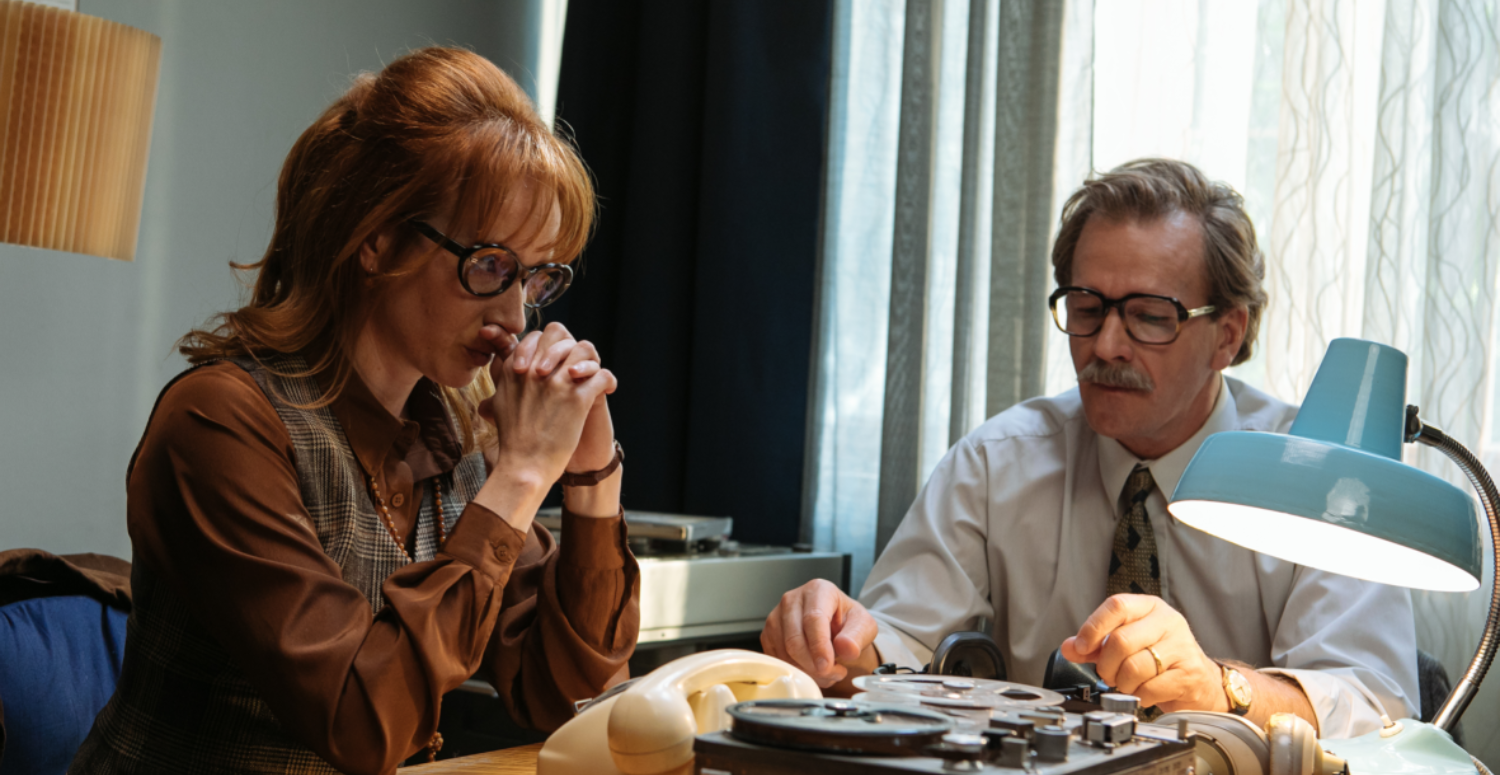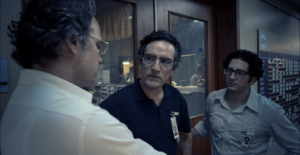Radio Prague
Les Ondes de la Révolte
Vlny (Waves)
Audience Award – Arras & Karlovy Vary
Best Film – Czech Lion
Best Director – Czech Lion
Best Supporting Actor & Actress – Czech Lion
Best Screenplay & Sound – Czech Lion
2024/2025

FR EN
C’est au printemps que la sève brûlante des premiers bourgeons d’aspirations sociales éclot au sein des peuples pour plus de liberté, égalité et fraternité ! Il y eut le Printemps arabe en 2011, le Printemps des peuples bien avant cela en 1848, et bien sûr le Printemps de Prague en 1968 où la fièvre (avec tout ce pollen) émancipatrice de la République socialiste tchécoslovaque apporta une nouvelle nuance à la bipolarité des deux blocs hermétiquement séparés par le rideau de fer, en expérimentant un certain ‘socialisme à visage humain’ qui ne plaisait guère à Moscou. Le film raconte ce moment d’exaltation populaire et de luttes politiques depuis l’intérieur de la radio d’État, précisément depuis la rédaction des informations internationales où le charismatique Milan Weiner dirige une équipe de journalistes attentive à démêler l’information de propagande pour faire entendre autant que possible la voix de la vérité. Il raconte l’un des moments les plus emblématiques de l’Histoire tchécoslovaque, à savoir l’invasion du pays par les troupes du Pacte de Varsovie, sous l’angle de journalistes lançant leurs dernières forces dans la bataille pour la liberté d’expression …
C’est un film qui entrelace la petite et la grande Histoire en imposant aux individus les plus ordinaires de choisir leur camp : se battre pour un idéal ou sauver sa peau. C’est une histoire de super-héros de la vérité au sein d’une rédaction de journalistes qui bouleversèrent les règles du journalisme d’alors, pour diffuser à la population des informations non censurées. Tous les personnages ont ainsi vraiment existé – le récit étant en cela très historique et réaliste – à l’exception du rôle principal Tomáš Havlík qui symbolise non seulement les citoyens ordinaires de l’époque, mais sert aussi de fil rouge à la fois pour nous faire entrer au sein de cette vibrante rédaction et donc au cœur d’un mouvement de résistance journalistique, ainsi que pour raconter les modes d’action et d’infiltration de la police secrète du régime totalitaire.
Si le film n’a rien de révolutionnaire dans sa forme et souffre de quelques scènes en trop quand la suggestion ou l’implicite aurait suffi, « Radio Prague » bénéficie d’une vraie force documentaire en même temps qu’il déploie un palpitant thriller, entre suspense et vérité historique, avec une seconde partie particulièrement captivante et une fin très réussie. Misant sur l’authenticité et la plongée dans les pages de l’Histoire, il réussit un gros travail d’étalonnage pour retrouver les couleurs et la texture des images de l’époque mêlant ainsi dans certaines scènes de nombreuses images d’archives avec ses propres personnages. Ecrit et réalisé par Jiří Mádl, ce film très acclamé en République Tchèque loue le courage, l’engagement et l’inventivité de ces professionnels des ‘ondes’ (titre original) qui ont marqué l’Histoire de leur pays – à l’image d’un potentiel clin d’œil (ou alors splendide coïncidence) au symbole martyr Jan Palach. C’est une leçon d’Histoire qui résonne tout particulièrement avec l’actualité dans sa lutte contre la manipulation publique et la désinformation médiatique orchestrées par les pouvoirs soviétique ou russe.
Raphaël Sallenave
{English below & Čeština níže}
It’s in spring that the burning sap of the first buds of social aspirations blossoms among peoples for greater freedom, equality and fraternity! There was the Arab Spring in 2011, the springtime of the peoples long before that in 1848, and of course the Prague Spring in 1968, when the emancipating fever (with all that spring pollen) of the Czechoslovak Socialist Republic brought a new shade to the bipolarity of the two blocs hermetically sealed by the Iron Curtain, by experimenting with a form of ‘socialism with a human face’ that did not sit well with Moscow. The film tells the story of this moment of popular excitement and political struggle from inside state radio, precisely from the international newsroom, where the charismatic Milan Weiner heads a team of journalists dedicated to untangling propaganda from news, to ensure that the voice of truth is heard as loudly as possible. It tells the story of one of the most emblematic moments in Czechoslovak history – the invasion of the country by Warsaw Pact troops – from the point of view of reporters throwing their last efforts into the battle for freedom of expression…
This is a film that blends the small and the big stories of history, forcing ordinary people to choose a side: to fight for an ideal or to save their own skin. It’s a story of truth-telling superheroes in a newsroom where journalists challenged the rules of journalism of the time, in order to get uncensored information out to the public. All the characters truly existed – making the story highly historical and realistic – with the exception of the lead role, Tomáš Havlík, who not only represents the ordinary citizens of the time, but also acts as a guiding light, taking us into the heart of this vibrant editorial team, and thus into the heart of a journalistic resistance movement, as well as revealing the ways in which the totalitarian regime’s secret police acted and infiltrated.
While the film’s form is far from revolutionary, and suffers from a few scenes too many when suggestion or implicit language would have sufficed, “Waves” displays a real documentary force, while at the same time unfolding a gripping thriller, somewhere between suspense and historical truth, with a particularly captivating second half and a very strong ending. Emphasizing authenticity and an immersion into the pages of history, the film’s color-grading and textures are reminiscent of the images of the time, and in certain scenes, extensive archival footage is combined with the film’s own characters with great effect. Written and directed by Jiří Mádl, this highly praised film in the Czech Republic celebrates the courage, commitment and inventiveness of these professionals of the ‘’waves’ who left their mark on their country’s history – with a potential nod (or just a wonderful coincidence) to the martyred symbol Jan Palach. This is a history lesson that is particularly relevant today in its battle against public manipulation and media disinformation orchestrated by the Soviet and Russian powers.
Raphaël Sallenave
ČEŠTINA
Na jaře ve světových národech raší první pupeny společenských snah o větší svobodu, rovnost a bratrství! V roce 2011 proběhlo Arabské jaro, o mnoho let dříve, v roce 1848, Jaro národů a samozřejmě Pražské jaro v roce 1968, kdy emancipační horečka Československé socialistické republiky (spolu se všudypřítomným jarním pylem) přinesla do bipolarity dvou bloků neprodušně oddělených železnou oponou nové nuance tím, že experimentovala s jistým “socialismem s lidskou tváří”, který se Moskvě příliš nezamlouval. Film vypráví o chvílích lidového nadšení a politického boje v Českém rozhlase, konkrétně v Redakci mezinárodního života, kde charismatický Milan Weiner vede tým novinářů odhodlaných oddělovat fakta od propagandy a co nejzřetelněji nechat znít hlas pravdy. Zaměřuje se na jeden z nejkritičtějších momentů československé historie, invazi vojsk Varšavské smlouvy, pohledem novinářů, kteří z posledních sil bojují za svobodu slova…
Ve snímku se prolínají velké a malé dějiny, kdy jsou obyčejní lidé postaveni před zásadní volbu: buď bojovat za své ideály, nebo si zachránit kůži. Je to příběh o superhrdinech pravdy v prostředí redakce a redaktorů, kteří překopali tehdejší pravidla novinařiny, aby poskytli veřejnosti necenzurované informace. Všechny postavy skutečně žily – v tom je film vysoce historický a realistický – s výjimkou hlavního hrdiny Tomáše Havlíka, jenž zosobňuje hlas běžných lidí té doby a zároveň slouží jako červená nit, která nás zavádí do nitra energické redakce a tedy i do srdce hnutí novinářského odporu, a stejně tak i ukazuje praktiky a způsoby infiltrace tajné policie v totalitním režimu.
Ačkoliv svou strukturou film nijak revoluční není a trpí několika zbytečnými scénami, které by mohl nahradit jen náznak či implikace, „Vlny“ mají skutečnou dokumentární hloubku a zároveň rozvíjejí strhující thriller, a to někde mezi napětím a historickou pravdou, s obzvlášť poutavou druhou částí a velmi silným závěrem. Snímek sází na autenticitu a vnoření do kapitol historie a díky práci s barevností věrně napodobuje dobové záběry, přičemž hrané scény mnohdy prokládá i archivními materiály. Film, který napsal a zrežíroval Jiří Mádl, a který byl v České republice velmi oceněn, vyzdvihuje odvahu, odhodlání a vynalézavost profesionálních pracovníků “vln”, kteří v historii své země zanechali stopy – a možná se i poklonil (nebo je to příhodná shoda okolností) symbolu umučeného Jana Palacha. Tato lekce z dějin o to více rezonuje v současném boji proti manipulaci veřejnosti a dezinformacím proudícím od sovětské, respektive ruské mocnosti.
Raphaël Sallenave
(Přeložil A.B.)

